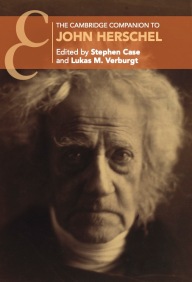My research focuses primarily on the history of astronomy, in particular the life and career of the British astronomer Sir John Herschel (1792-1871). Herschel was the most important natural philosopher of the Victorian period, contributing to astronomy, chemistry, optics, photography, and the philosophy of science during the period in which science moved from the realm of gentleman practitioners to professionalized disciplines. I am interested in relationships between amateurs and professional astronomers during this period, as well as the interactions between science and religion. I am co-editor of the forthcoming Cambridge Companion to John Herschel and am co-authoring a new history of astronomy for Reaktion Books.
Books:

Making Stars Physical: The Astronomy of Sir John Herschel (University of Pittsburgh Press, 2018).
Creatures of Reason: John Herschel and the Invention of Science (University of Pittsburgh Press, forthcoming)
Edited Volumes:

with Lukas Verburgt, The Cambridge Companion to John Herschel, Cambridge University Press, 2024.

with Marvin Bolt, Engaging the Heavens: Inspiration of Astronomical Phenomena V, Astronomical Society of the Pacific Conference series volume 468, 2012.
Articles, Papers, and Appearances:
“John Herschel’s Reform of Science,” Physics Today feature article (June 2023)
———Translated in Pour la Science (April 2024)
“The controversial origins of naming moons,” Physics Today news feature (May 2023)
“Where God Dwelt,” Aeon Magazine (December 2022).
“How the Moon and Sun Shaped our Calendars,” Fox Weather (July 20, 2022).
“Naming the Universe,” Aeon Magazine (February 2020).
———Reprinted in American Scientist (May/June 2020).
“A ‘Confounded Scrape’: John Herschel, Neptune, and Naming the Satellites of the Outer Solar System,” Journal for the History of Astronomy 50.3 (2019): 306-25.
Entry on “Pierre-Simon de Laplace,” in Dictionary of Christianity and Science (Zondervan, 2017).
“‘Land-marks of the Universe’: John Herschel Against the Background of Positional Astronomy,” Annals of Science 72.4 (2015): 417–34. (2014 Prize Essay, also available online.)
“How Bright Planets Became Dim Stars: Planetary Speculations in John Herschel’s Double Star Astronomy,” Endeavour 38 (2014): 27–34.
“‘These Divine Animals’: Physicality of the Stars in Platonic and Aristotelian Thought,” Newberry Essays in Medieval and Early Modern Studies, Vol. 7: Selected Proceedings of the Newberry Center for Renaissance Studies 2013 Multidisciplinary Graduate Student Conference (2013): 35–40.
“Divine Animals: Plato, Aristotle, and the Stars,” Mercury 42.3 (Summer 2013): 28–33.
“Evidential Reasoning in Astronomy and Cosmology: Some Reflections,” History of Science Society Newsletter 42 (Apr 2013): 32–34.
“‘Insufferably Stupid or Miserably Out of Place’: Frederick A. P. Barnard and His Scientific Instrument Collection in the Antebellum South,” Historical Studies in the Natural Sciences vol. 39, no. 4 (2009): 418–43.
Dioptrice
As a graduate student at Notre Dame, I worked as a research and curatorial intern at the Webster Institute for the History of Astronomy at the Adler Planetarium. There I helped create and curate an online database of surviving pre-1750 refracting telescopes. The database received some press in the AAAS’s online publication and on the science and tech website, Motherboard.tv.
My full research CV can be found here.
For more on my research, see my Academia page.
